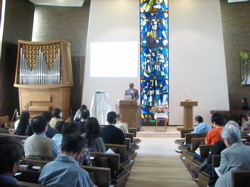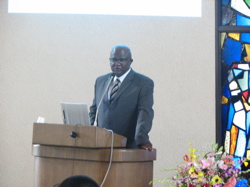Center for Interdisciplinary Study of Monotheistic Religions(CISMOR)Doshisha University
> Public Lectures > At the Center of Africa, Congo: Religion, Liberation Wars, HIV-AIDS and World Cooperation (Japan)Public Lectures
Lecture (Open for the public)
At the Center of Africa, Congo: Religion, Liberation Wars, HIV-AIDS and World Cooperation (Japan)
| Date: |
2008/09/27 14:00-16:00 |
|---|---|
| Place: | Chapel in the Divinity Hall, Imadegawa Campus, Doshisha Univ. |
| Lecture: | Prof. Felix U. Kaputu ( University of Lubumbashi ) |
| Summary: | |
|
After the 12th century, Europe began its advance into Africa, which had earlier been called the continent of darkness. Europe discovered and colonized African provinces one after another, such as present-day Morocco, Guinea, and so on. Then, as the result of conferences held in Europe, European powers divided the provinces and decided their administrative borders. As the result, the Congo came under the governance of Leopold II and the kingdom of Belgium in 1885. Under the governance of Leopold II, many people of Congo were pulled into rubber harvesting. As a result, millions of people died and underwent punishments, such as having their hands or legs amputated because they could not gather enough rubber. Meanwhile, children who did not obey at their work went to the mission schools, many growing up wishing to be soldiers in the future in order to resist the foreign countries visiting Africa for the slave trade. What legitimized colonization for Belgium was, officially, the mission of Christianity in Africa, including the Congo where the people adhered to animism and idolatry. However, as described above, the actual reason was rubber harvesting. And the Congolese people were also forced into cobalt mining, deforestation, and so on. Given this history, what the Congo experienced after independence from Belgium in the 20th century was an afflicted internal situation. Only less than 10 percent of the people are educated, and others can’t find work. Moreover, the timing of independence was unfortunate. Congolese diplomacy was thrown into the confusion of Cold War, while the country badly needed foreign aid. As regards internal affairs, most of the social problems from colonial times were left unresolved as autocratic regimes were established beginning in the 1960s. The most serious example was the educational circumstances of women, especially in relation to the HIV problem. Some poor women had insufficient sex education and began to turn to prostitution. As they emigrated continually to Somalia, Ethiopia, Namibia, Angola, and so on looking for salaries, they accidentally spread HIV around the Congo. The lecturer declared as a view toward the near future that the Congo and Japan should establish relationships through educational institutions. Because the subjects that the lecture presented were so varied, it taught us powerfully to recognize that the Congo has many troubles and problems that we, the outside world, should help it confront. Kenichiro Takao (Graduate Student of School of Theology, Doshisha University) |
|
|
Handout |
|

